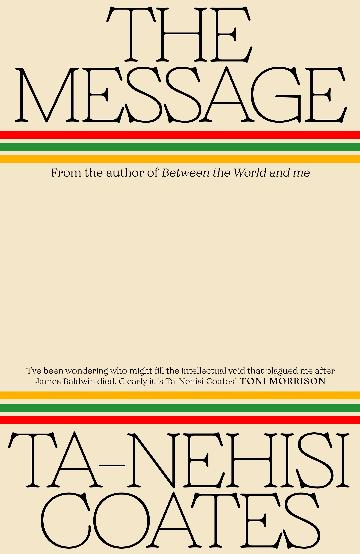Ta-Nehisi Coates
The Message
The Message
Couldn't load pickup availability
Gabi's Review
Ta-Nehisi Coates originally intended writing a book in the style of George Orwell's famous essay ‘Politics and the English Language.’ However, as he developed his ideas in The Message, he was confronted with profound questions about how narratives - whether they be our reporting, imaginative tales, or myths – can both illuminate and mislead. Coates is a journalist, author of non-fiction and an activist, whose brilliant creative mind brings a fresh and passionate perspective to his subjects.
In the book’s first of three interlinked essays, Coates takes us on a journey to Africa, where he struggles with living in two places simultaneously: Dakar, a modern city in Senegal, and a mythical kingdom within his mind in terms of his own origin story. He then discusses South Carolina, where he reports on the banning of his book, as well as examining the nation’s recent confrontation with its racist history and the deeply ingrained American mythology of racial superiority, symbolised by the statues of segregationists looming over the state’s public squares.
The longest most compelling section of the book recounts Coates’ experience of Palestinians living in Israel. He likens his findings to the realities of Jim Crow’s America and apartheid in South Africa. He is appalled by the bureaucratic marginalisation of Palestinians that diminishes if not completely erases their sense of agency. While he has been criticised for not acknowledging the genuine efforts in the past to support Palestinian rights, his essays nonetheless make for timely and exceptional reading about the complex situation that has escalated into the current war in the Middle East.
Publisher's Review
With his bestseller, Between the World and Me, Ta-Nehisi Coates established himself as a unique voice in his generation of American authors; a brilliant writer and thinker in the tradition of James Baldwin.
In his keenly anticipated new book, The Message, he explores the urgent question of how our stories - our reporting, imaginative narratives and mythmaking - both expose and distort our realities. Travelling to three resonant sites of conflict, he illuminates how the stories we tell - as well as the ones we don't - work to shape us.
The first of the book's three main parts finds Coates on his inaugural trip to Africa - a journey to Dakar, where he finds himself in two places at once- a modern city in Senegal and the ghost-haunted country of his imagination. He then takes readers along with him to Columbia, South Carolina, where he reports on the banning of his own work and the deep roots of a false and fiercely protected American mythology - visibly on display in this capital of the confederacy, with statues of segregationists still looming over its public squares. Finally in Palestine, Coates sees with devastating clarity the tragedy that grows in the clash between the stories we tell and reality on the ground.
Written at a dramatic moment in American and global life, this work from one of the country's most important writers is about the urgent need to untangle ourselves from the destructive myths that shape our world - and our own souls - and embrace the liberating power of even the most difficult truths.
Share


